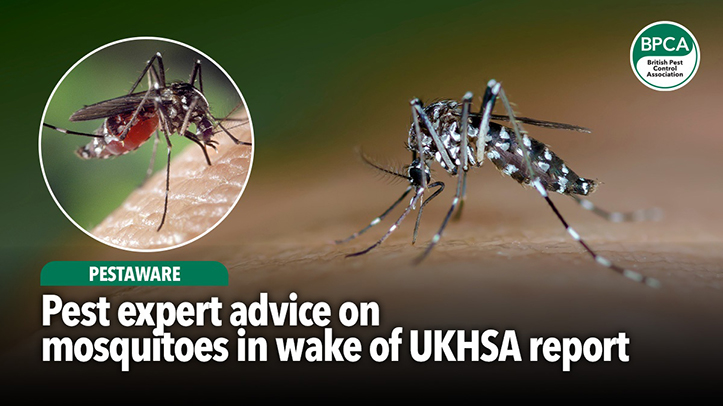The British Pest Control Association (BPCA) has issued public guidance on preventing mosquito infestations, following a UK Health Security Agency (UKHSA) report confirming the discovery of two invasive mosquito species in the UK.
Eggs from the Egyptian mosquito (Aedes aegypti) were detected for the first time in the UK at Heathrow Airport in September 2023, while Asian tiger mosquito (Aedes albopictus) eggs were found at a service station on the M20 in Kent in August 2024 – the first since 2019.
Both discoveries prompted increased surveillance, but no further evidence of established populations has been found.
More than 300 mosquito monitoring traps are now in place across England and Wales as part of UKHSA’s ongoing surveillance programme aimed at preventing invasive species from becoming established.
BPCA responds with public messaging
BPCA issued a PestAware press release to reassure the public that while the findings are significant, the risk to the UK population remains low.
Niall Gallagher, BPCA technical manager, said: “The UKHSA’s findings are significant as both Egyptian and Asian tiger mosquitoes are vectors of diseases including dengue fever, chikungunya and Zika virus, but the report makes it clear that there is no evidence that they have become established.
“The main issue with bites from native UK mosquitoes is that they can cause swelling and itchiness, which causes some discomfort.
“In some cases, a reaction to the bite or infection caused by scratching can require further action, and we would recommend checking advice on insect bites and stings at nhs.uk.”
Public advice issued
BPCA’s public message focused on simple prevention steps householders can take to reduce breeding sites and avoid attracting mosquitoes.
The Association advised people to:
- Keep windows and doors closed at dawn and dusk when mosquitoes are most active;
- Use fly screens on windows and doors;
- Fit lids to water butts and empty outdoor containers such as watering cans, buckets and paddling pools;
- Remove stagnant water from troughs and bird baths; and
- Dispose of any dead mosquitoes promptly to avoid secondary infestations from scavenging pests.
BPCA also reminded the public that female mosquitoes lay eggs in standing water, which can hatch and reach adulthood in just a few days during warmer months. Eggs laid in late summer can overwinter and hatch when temperatures rise, meaning prevention is key.


